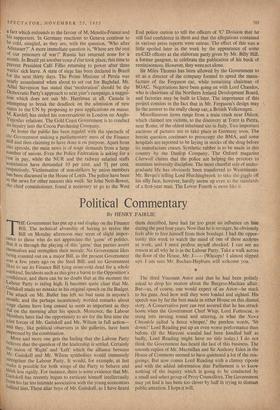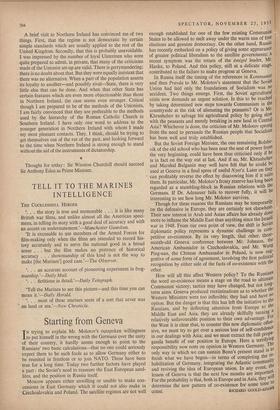Political Commentary
BY HENRY FAIRLIE.
irHE Government has put up a sad display on the Finance Bill. The technical absurdity of having to revive the Bill on Monday afternoon may seem of slight impor- tance to those who do not appreciate the 'game' of • politics. Hut it is through the playing of this 'game' that parties assert themselves and strengthen their morale. No Government likes being counted out on a major Bill, as the present Government was a few years ago on the Steel Bill; and no Government likes to see its Finance Bill lying stone-cold dead for a whole weekend. Incidents such as this give a boost to the Opposition's confidence, and there can be no doubt that at the moment the Labour Party is riding high. It becomes quite clear that Mr. Gaitskell.made no mistake in his original speech on the Budget. The attack on Mr. Butler has left no bad taste in anyone's mouth; and the perhaps incautiously worded remarks about Wage claims have long ceased to seem as important as they did on the morning after his speech. Moreover, the Labour Members have had the opportunity to see for the first time the joint forces of Mr. Gaitskell and Mr. Wilson in full action- ``lld they, like political iobservers in the galleries, have been Impressed by the combination. More and more one gets the feeling that the Labour Party believes that the question of the leadership is settled. Certainly the union of 'Right' and 'Left' which the alliance between Mr. Gaitskell and Mr. Wilson symbolises would immensely `Ireligthen the Labour Party. It would, for example, at last make it possible for both wings of the Party to behave and think less rigidly. For .instance, there is some evidence that Mr. Gaitskell has recently begun to extricate himself intellectually from his far too intimate association with the young economists behind him. These altar boys of Mr. Gaitskell, as I have heard. them described, have had far too great an influence on him during the past four years. Now that he is stronger, he obviously feels able to free himself from their bondage. I had the oppor- tunity this week to watch the mind of one of these acolytes at work, and I must profess myself shocked. I can see no reason at all why he is in the Labour Party. Take a walk across the floor of the House, Mr J— (Whoops! I almost slipped up). 1 am sure Mr. Buchan-Hepburn will welcome you.
The third Viscount Astor said that he had been politely asked to drop his motion about the Burgess-Maclean affair. But—as, of course, one would expect of an Astor—he stuck to his guns. And how well they were loaded and sighted. His speech was by far the best made in either House on this dismal. story. A Conservative peer can rest assured that he has struck home when the Government Chief Whip, Lord Fortescue, is stung into turning round and uttering, in what the News Chronicle called `a fierce whisper,' the peerless words, 'Sit down !' Lord Reading put up an even worse performance than before. (If the Marconi scandal had been handled half as badly, Lord Reading might have no title today.) I do not think the Government has heard the last of this business. The smooth replies of Mr: Macmillan and Sir Anthony Eden in the House of Commons seemed to have quietened a lot of the mis- givings. But now comes Lord Reading with a clumsy riposte and with the added information that Parliament is to know nothing of the, inquiry which is going to be conducted by a small and select group of Privy Councillors. The Government may yet find it has been too clever by half in trying to distract public attention. I hope it will. A brief visit to Northern Ireland has convinced me of two things. First, that the regime is not democratic by certain simple standards which are usually applied to the rest of the United Kingdom. Secondly, that this is probably unavoidable. I was impressed by the number of loyal Ulstermen who were quite prepared to admit, in private, that many of the criticisms made of the Unionist set-up are valid. There is gerrymandering; there is no doubt about that. But they were equally insistent that there was no alternative. When a part of the population asserts its loyalty to another—and possibly rival—State, there is very little else that can be done. And when that other State has certain features which are even more objectionable than those in Northern Ireland, the case seems even stronger. Critical though I am prepared to be of the methods of the Unionists, I am fairly convinced that they are preferable to the methods used by the hierarchy of the Roman Catholic Church in Southern Ireland. I have only one word to address to the younger generation in Northern Ireland with whom I made my most pleasant contacts. They, I think, should be trying to get themselves out of the rut of the past, and looking forward to the time when Northern Ireland is strong enough to stand without the aid of the instruments of dictatorship.
Thought for today : Sir Winston Churchill should succeed Sir Anthony Eden as Prime Minister.



























































 Previous page
Previous page